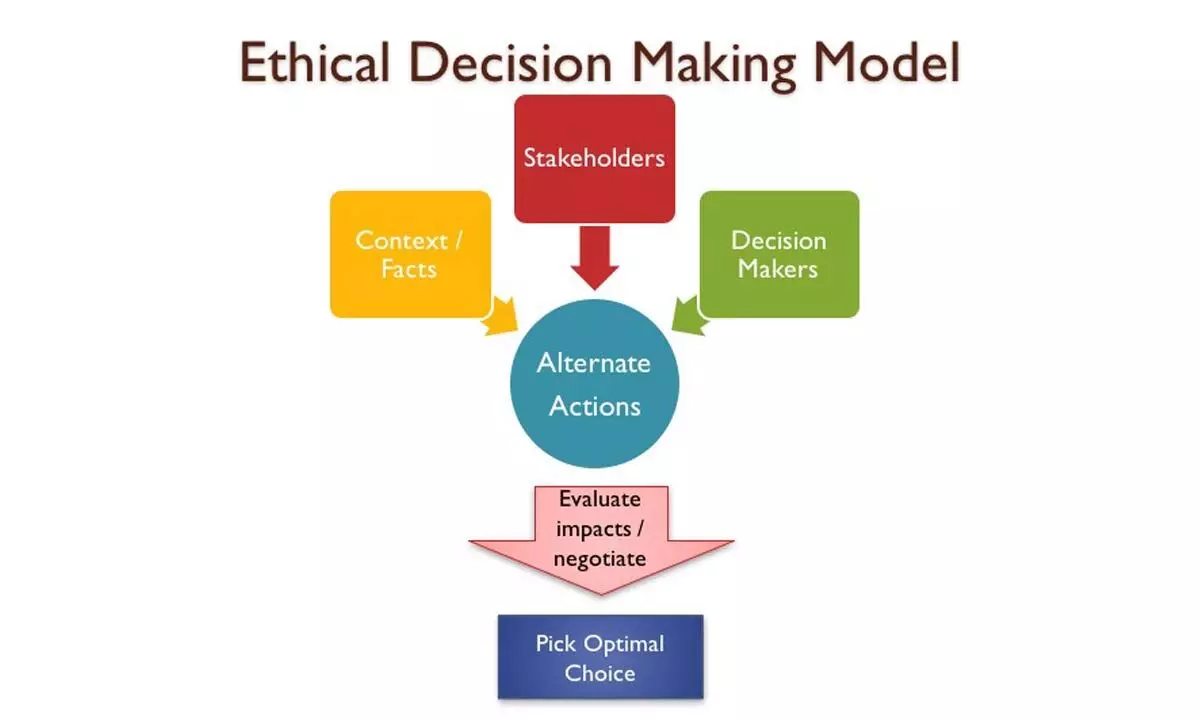Decision making must stem from ethical rationality
Ethics are not pretentious commandments to fulfill our moral duties
image for illustrative purpose

Unethical desires are driven by the temptation to avoid necessary troubles and gain disproportionate benefits but this is a red herring, since in the longer run, this approach does not lead to rewards. Ethical thinking comes from rationality and reason and is not a hollow moral iteration
We find ourselves in a time where there is little space for reflection and yet, concerns about what is right and what is wrong continue to exist in all domains of life. If anything, in today’s fast-paced life, these distinctions have become increasingly blurred and have led us to several challenges and crises. From profiteering in the world of business to widespread inequality in social structures to difficult situations in personal lives, morally grey categories have mushroomed to the detriment of all actors involved. Ethical decision making, therefore, has acquired a renewed significance and also merits a redefinition to suit our increasingly complex realities.
One major reason for deploying ethics when it comes to making decisions is the fact that phenomena in the universe are larger than us. For example, in a situation like the crisis engendered by the Covid-19 pandemic, unethical self-interest might have suggested the hoarding of crucial resources to keep ourselves safe instead of distributing them for the greater good. However, such a proposition could only have accrued a short-term benefit and a delusion of security, as had the situation in the world deteriorated and become uncontrollable, we would have found ourselves in greater danger. Unethical desires are driven by the temptation to avoid necessary troubles and gain disproportionate benefits but this is a red herring, since in the longer run, this approach does not lead to rewards.
Therefore, ethical thinking comes from rationality and reason and is not a hollow moral iteration. In fact, morality is linked to rationality without using a sentimental register of sacrifice through the ethical route. A Brown University publication suitably notes, “Another way to think about the relationship between ethics and morality is to see ethics as providing a rational basis for morality, that is, ethics provides good reasons for why something is moral.”
Consider another example, this time at the level of your personal life. If some friends has not been close to you lately and it has caused you animosity, the temptation to confront them brutally or cause harm might seem hard to resist, but it will cause irreparable damage to your relationships, repute and self-image. The ethical way out would be in waiting, reaching out politely and airing your issues out through careful conversation. Even if the ethical path seems more cumbersome and less exciting, it is a judicious way to aspire for security and joy, rather than setting yourself up for disaster for short-term gratification.
A huge instance to consider the significance of ethics is the fall in public trust in institutions and ethical performance becomes a tremendously important factor.
As a Michigan State University publication reports, “[…] public trust in business fell slightly from 2016 to 2017, more people (52%) continued to trust companies “to do what is right” compared to the media (43%) and government (41%), the annual Edelman Trust Barometer found. Business lagged only non-governmental organizations (53%) in the level of trust among four institutions, according to Edelman, a global communications marketing firm. Three out of four respondents said businesses can boost profits while also enhancing their communities socially and economically. Business is “the last retaining wall” for public trust, the survey found. Maintaining that wall calls for a strong and consistent commitment to ethics.”
While these examples illustrate the indispensability of ethics in making decisions in all domains of life, we need to grapple with the real-life particularities of the same. How do we ensure that we deploy ethical action? For starters, we need to understand that ethics are not preachy and pretentious commandments to fulfill our moral duties but necessary for sustenance of our lives itself. Therefore, ethics have to become one and continuous with our way of life. The second thing to remember is that ethics are linked to rationality and therefore an ethical decision has to be an informed decision. Reliance on facts and vigilant observations can therefore pave the way for ethical resolutions. This also involves an appropriate assessment of the consequences of a decision or how it turned out for yourself and other people, since an investment in ethics is not about specific episodes of good action but a consistent way of living.
On the whole, even as we move towards an exceedingly unpredictable future at an unprecedented pace, we must not disregard moral considerations, for they are rationally linked to the continuity of our lives. Ethics provide us with the necessary standards outside of the imposed logical strictures to responsibly strive for a better life and a better world and decisively make worthy contributions to our individual and collective well-being.
(The author is Founder & CEO Upsurge Global and Adjunct Professor and Advisor EThames College)

